Globalization With Arab Characteristics
Globalization With Arab Characteristics
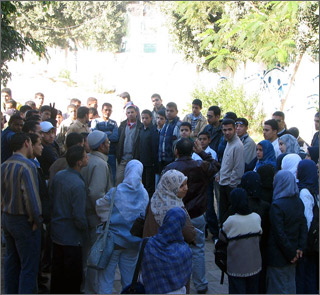
and poor business practices, cannot join the globalized world
WASHINGTON: The Arab world desperately needs jobs for its young adults, but foreign employers are afraid to commit in nations with authoritarian regimes, where regulation and the legal landscape remain shrouded in uncertainty. A lack of jobs, combined with no system for transfer-of-power and lack of trust in younger generations, could lead to a self-reinforcing downward spiral, both politically and economically.
Job creation is not only a political and demographic imperative for the Arab world, but also a security concern for the globe.
The Middle East has the world's lowest rate of labor-force participation among working-age adults. That rate has converged on the global norm, spurred by females entering the workforce. Despite strong growth, the region treads water in terms of employment. Job creation keeps pace with rising labor-force participation, but hasn't dented the region's high unemployment rates, especially among the young.
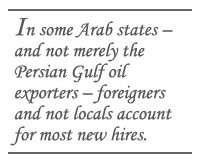
With a few exceptions, employment grown in industries where productivity is increasing - that is, it does not appear to reflect an expansion of activity in rising dynamic sectors such as information technology-related services. In some Arab states - and not merely the oil exporters of the Persian Gulf - foreigners and not locals account for most new hires. This phenomenon is more acute in the private sector, since nationals disproportionately enter public-sector employment.
One method of rapidly creating a sustainable increase in employment is through an expansion of labor-intensive manufacturing or services exports. But manufacturing exports are modest, facing stiff competition from China and India. Foreign-investment flows surged in recent years, but are largely the product of intraregional petrodollar recycling. It's doubtful that these financial flows, unlike investment in factories undertaken by industrial firms, will convey new technology that would accelerate productivity growth.
The Arab countries score relatively poorly on a nexus of indicators relating to cross-border economic integration and the transfer, dissemination and application of technological knowledge and innovation. Relatively weak intellectual property rights protection and state domination of many industries have retarded technology transfer and absorption. Local technical capacity, on which a dynamic industrial sector could be built, is uncertain. It is possible that with institutional or policy reform latent capabilities would manifest themselves, but under current conditions, evidence of industrial competence is muted.
This bleak situation may partly reflect the relative absence of outside catalysts. As a group, the Arab countries have weak linkages to the outside world, with the exceptions of extractive industries and tourism, where geology or special attractions like the Pyramids confer irreproducible advantages. In short, any links between the latent productive possibilities of the Arab people with goods and services demanded in the global market appear weak or nonexistent. The relative isolation from international technology inflows, whether in the form of FDI or technology licenses or the use of foreign consultants, has stunted productivity growth. Isolation inhibits the ability of firms, most locally owned, in Algeria, Egypt and Morocco to enter international markets in new product areas, despite membership in the WTO and preferential market access through special trade agreements.
Building such links presents a formidable challenge. Addressing the institutional weaknesses requires a prolonged and uncertain slog including building a higher quality technically oriented education system and improving the intellectual property rights regime.
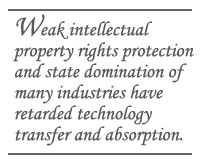
Under such circumstances the issues of setting priorities and linkage are non-trivial. Today's success stories in East Asia, for example, did not get everything right from the start, maintaining economically questionable practices in some sectors for extended periods of time. In terms of corruption, all have not achieved Nordic levels of probity today, much less at the start of their periods of rapid growth. It may be that strong performance in some areas compensate for weakness in others.
The region's reputation as a risky business environment certainly inhibits reform, in part due to deep uncertainty about the future of many political regimes. While the region's contemporary economic performance may not be distinctive, its enduring political authoritarianism is. Some of the region's governments rely on relatively narrow ethnic, religious or tribal constituencies, contributing to fundamental uncertainty about political transition and the nature of successor regimes.
The region's lack of political dynamism in the face of underlying social change, together with the increasingly religious orientation of the political opposition, paradoxically raises the possibility of abrupt transitions or regime changes. Intermittent terrorist incidents elevate the risk premium. Such deep political uncertainty discourages behavior that involves irreversibility - from physical investment to investing in education.
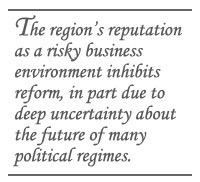
That said, one is struck by the degree of intraregional variation in the indicators such as the amount of time or number of approvals it takes to open a new business, as reported in our book "Arab Economies in a Changing World." This intra-group variation is important for two reasons: First, it suggests that whatever determines outcomes on these measures is not necessarily culturally or religiously determined. The influence of Islam or the anthropology of Arab culture may have many effects on local institutions and practices, but cannot explain why it takes nearly three times as long to enforce a contract in Egypt as it does in Jordan. Second, for some countries, there could be considerable gains associated with achieving "best-practice" as defined by colleagues in their region. They need not become Norway.
These issues are anything but value-free. Professional economists often focus on efficiency, but other values matter as well. In a poll recently conducted by Zogby International in Egypt, Jordan, Lebanon, Morocco, Saudi Arabia and the UAE, majorities in four of the six countries supported governing business by sharia law, with pluralities in all six agreeing that sharia required further interpretation to enable businesses in the Muslim world to integrate into the global economy.
The views elicited in the Zogby poll could be interpreted as forming a basis for adapting the demands of globalization to local values, and one can imagine an alternative set of institutions and practices that would deliver the benefits yielding reform with Arab characteristics, to paraphrase the Chinese experience. Islamic finance might be an example. But the Washington Consensus it is not.
Another poll conducted by the Pew Research Center found that while popular attitudes in the Middle East do not appear to be "anti-market," as some have alleged, they are not particularly supportive of the process of globalization on existing terms. The issue is how to square efficiency with the values and aspirations of local communities.
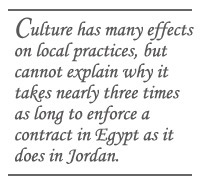
The Middle East has long been a politically contested region of global significance. The demographic pressures the region faces to productively employ its young people raise the stakes even higher. It's not difficult to envision the region caught in a downward spiral where impoverishment, discontent, militancy and repression feed upon one another, deterring reform and impeding growth.
Yet this is not the only possible future path. Over the past year, Egypt, for example, made prodigious advances in the World Bank's ease-of-doing-business rankings. Dubai aims to become the Singapore of the Middle East. Abu Dhabi has contracted with the Singapore government to improve its educational system. If the governments can address their daunting employment challenge, the region's demographics could turn from a potential burden to a valuable asset. The Arab world could reap a demographic dividend as the new generation enters its most productive working years - a phenomenon that contributed to the outstanding performance of East Asia over the past four decades or so. Growing prosperity, confidence and optimism about the future could underpin movement toward greater political openness and social tolerance.
Marcus Noland is a senior fellow with the Peterson Institute for International Economy. Howard Pack is a professor with the Wharton School, University of Pennsylvania. They are the authors of “Arab Economies in a Changing World,” published by the Peterson Institute in 2007.